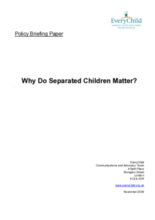EveryChild is an international development charity working in over 15 countries around the world with a focus on children separated from their families and communities or in danger of being so. Their agency does this through three different intervention types: Prevention, Protection and Re-integration.
EveryChild believes the separation of children from their families or usual carers in developing countries is seriously undermining attempts to build healthy communities and meet development goals. Articles 7, 8 and 9 of the United Nations Convention on the Rights of the Child state that children have the right to be cared for by their parents, that governments must respect family ties and children should only be separated from their families if it is in the best interests of the child.
Separated children are boys and girls who have been separated from their parents, carers or families over a period of time. There are many push factors that can result in separation, including poverty, violence and abuse in the home, the death of parents, armed conflict or natural disasters. Separated children are not a homogenous group. Separation comes in many different forms. The challenge for organisations working with vulnerable children is delivering interventions informed by research that indicates the specific nature of separation in different contexts.
There is very little policy and research around separation as a global issue with most NGOs and governments preferring to focus on analysis of specific groups of vulnerable children such as street children or child labourers. EveryChild believes that the additional damage of separation is hidden within these groupings. A lack of understanding of the specific situations and needs of highly marginalised separated children means that many interventions may fail to target their specific needs. It is essential that research is undertaken that looks at separation as a specific issue to ensure that interventions reach the most vulnerable children within these and other groupings. EveryChild hopes this paper and the research planned to follow will enrich our understanding of separation as a global development issue and enable us to advocate more effectively on behalf of children separated or at risk of being so.

